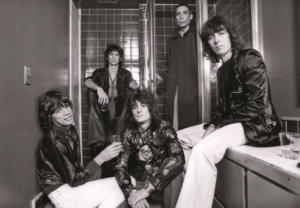10 Classic Rock Bands With Great Albums But Hated Each Other Behind The Scene

via TheManFromCabo / YouTube
Classic rock bands often produced amazing music, but many struggled with personal conflicts. Behind the scenes, disagreements and rivalries sometimes made working together difficult. Despite these issues, they still managed to create albums that fans loved.
1. The Beatles
The Beatles made some of the most famous songs in history. But as time went on, tensions grew. John Lennon once called Paul McCartney’s music “Granny music,” showing his dislike for some of Paul’s songs. These disagreements led to the band’s breakup in 1970.
Even with their problems, The Beatles released albums like “Sgt. Pepper’s Lonely Hearts Club Band” and “Abbey Road.” Their music continues to influence artists today, even though they couldn’t stay together as a group.
2. Fleetwood Mac
Fleetwood Mac’s album “Rumours” was a huge success. But during its recording, the band members were dealing with breakups and personal issues. Stevie Nicks and Lindsey Buckingham ended their relationship, and John and Christine McVie divorced.
Despite these challenges, they created songs like “Go Your Own Way” and “Dreams.” Their personal struggles added depth to their music, making “Rumours” one of the best-selling albums ever.
3. The Eagles
The Eagles had many hits, but the band members often didn’t get along. Don Henley and Glenn Frey had different ideas about the band’s direction. Their disagreements sometimes led to fights during concerts.
Still, they made popular songs like “Hotel California” and “Take It Easy.” Their music remains popular, even though the band faced many internal conflicts.
4. Pink Floyd
Pink Floyd’s music was known for its deep themes and unique sound. However, Roger Waters and David Gilmour often disagreed. Waters once said Gilmour was a “jolly good guitarist and singer” but questioned his creative input.
These issues led to Waters leaving the band. Despite this, albums like “The Wall” and “Dark Side of the Moon” are still considered classics.
5. Oasis
Oasis, led by brothers Liam and Noel Gallagher, had a rocky relationship. They often insulted each other in public, with Liam calling Noel a “potato.” Their constant fighting eventually caused the band to split.
Even with their arguments, Oasis produced hits like “Wonderwall” and “Don’t Look Back in Anger.” Their music defined a generation, even if they couldn’t stay united.
6. Guns N’ Roses
Guns N’ Roses became famous with songs like “Sweet Child o’ Mine.” But lead singer Axl Rose and guitarist Slash had a strained relationship. Axl once called Slash a “cancer” in the band.
Their disagreements led to Slash leaving the group. Despite this, their album “Appetite for Destruction” remains one of the best-selling debut albums.
7. Van Halen
Van Halen had issues with lead singers. David Lee Roth and Sammy Hagar both had conflicts with the band. Hagar once said he “wanted to break the guy’s f-in’ neck” over concert no-shows.
These problems didn’t stop them from making hits like “Jump” and “Panama.” Their energetic performances kept fans coming back.
8. The Kinks
The Kinks, formed by brothers Ray and Dave Davies, had a history of fighting. Their arguments sometimes turned physical, affecting their performances.
Even with their issues, they created memorable songs like “You Really Got Me.” Their influence on rock music is still felt today.
9. The Who
The Who’s Roger Daltrey and Pete Townshend had a complicated relationship. Daltrey called Townshend a “genius but a difficult man,” highlighting their struggles.
Despite their differences, they produced iconic songs like “Baba O’Riley” and “My Generation.” Their music captured the spirit of their time.
10. Def Leppard
Def Leppard faced challenges during the making of their album “Hysteria.” Drummer Rick Allen lost his arm in an accident, and guitarist Steve Clark battled addiction.
Through determination, they completed the album, which included hits like “Pour Some Sugar on Me.” Their story shows how bands can overcome adversity to create lasting music.


















